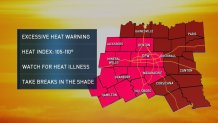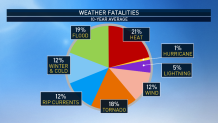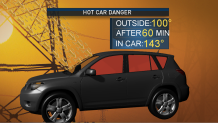The National Weather Service office in Fort Worth issued an Excessive Heat Warning for parts of North Texas through Saturday evening.
What is an excessive heat warning? It's a warning issued when heat indices range between 105 to 110 degrees for two or more hours.

Overnight temperatures will also stay very warm during this time, a situation which does not give time for our bodies to cool down. A heat warning means that some people can be seriously affected by heat if precautions are not taken.
It really nails home the point of it being hot when you have to work outside in it. Construction workers and road maintenance crews have no choice.
But despite an excessive heat warning for the area some people still choose to be out in it.
"I think we'd rather be hot than inside at this point,” Darla Woods said while sitting outside at the Dallas Farmers Market. “You know you get to a point where I don't care just we got to get out."
No matter why you are out the excessive heat can be dangerous according to MedStar.
"Just in the last three days however we've had over 40 patients treated for heat-related illness,” MedStar spokesperson Matt Zavadsky said. “31 of those have gone on to area hospitals they were that serious. Two of those patients were critical."
Zavadsky advises if you are going to be outside over the weekend you should start prepping now.
"If you know this is Friday and tomorrow I'm going to go work in the yard or I'm going to do something outdoors start drinking water heavily today and really prehydrate,” Zavadsky said. “Then continue to hydrate all the time you are outdoors in the heat."
MedStar paramedics face even hotter situations right now with equipment having to be worn because of coronavirus concerns.
"The gowns, the masks, the goggles, the multiple layers of gloves, those things are very hot,” Zavadsky said. “When you are outside in 108-degree weather treating somebody who has a heat-related illness or any medical condition when they are outdoors can really be a problem for the first responders."
So, if you must go out remember you'll need to stay safe and find ways to beat the heat.
Fort Worth has two cooling centers open at the Andrew 'Doc' Session and Sycamore Community Centers.
Dallas libraries and rec centers are closed due to coronavirus. The city is referring people to the Salvation Army for cooling relief options.
In addition to raising public awareness of the heat, the issuance of a heat warning will alert hospitals and officials to take certain actions to prepare and respond to an increase in emergency calls and activate programs to check on the elderly and the homebound. Often in North Texas, cooling centers are opened.
Heat can be dangerous and at times deadly. Heat is the number one cause of weather-related deaths. According to a National Weather Service report, in a 10-year period, more people lost their lives from heat than hurricanes and tornadoes combined.

Heat deaths are preventable.
Make sure if you are outside or work outside that you take frequent breaks in the shade or air conditioning. Check on people who are without air conditioning. Drink plenty of water to keep hydrated. Drink water even if you don’t feel thirsty. Dress in light-colored, loose fitted clothes.
Know the symptoms of heat exhaustion: Heavy sweating, cool clammy skin, fast weak pulse, nausea or vomiting, muscle cramps, tiredness, dizziness, fainting or headache.
What to do: Move to a cool place, loosen your clothes, put cool damp cloths on the body, sip water. Get medical help if you are throwing up or if your symptoms last for longer than one hour.
Know the symptoms of heatstroke: Body temperature over 103 degrees, redness to your skin, fast strong pulse, dizziness, headache, nausea, confusion, losing conscience (passing out). If these symptoms are present call 911 right away. Try to lower the person's body temperature with a cool damp towel or a mildly cool bath. Do not give the person anything to drink.
Never leave children or pets in a car. Even with the windows cracked, the inside of a car can become deadly in just a matter of minutes. On a 90 degree day, it only takes 10 minutes for the internal temperature of your car to reach 109 degrees. Within 30 minutes, the internal temperature can exceed 125 degrees. On a 100 degree day, the internal temperature can be 143 degrees in an hour.

See the latest weather forecast from NBC 5's team of Weather Experts below.



